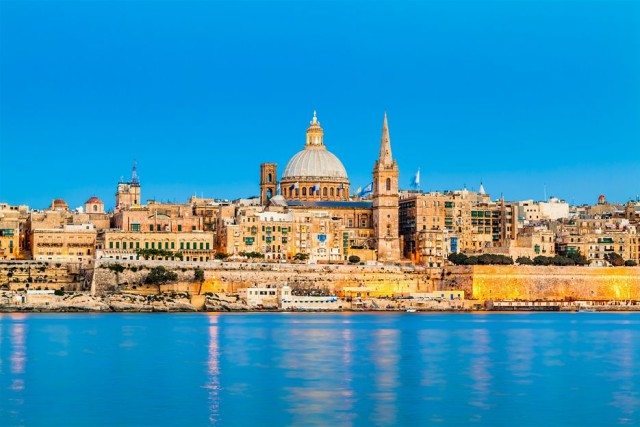Un pugno di isole di sole perse tra Europa e Africa: è Malta. Neanche gli spagnoli, gli arabi o i fenici sono riusciti a dominarla veramente. L’arcipelago è come se non avesse mai avuto una sorte, estraneo al tempo e alla storia. Malta appartiene solo a sé stessa. Chi vi approda ha un po’ lo stesso spirito.
Eppure, sembra ci sia un ponte che avvicina La Valletta alle nostre coste calabresi, in particolare alla parte ionica. I libri di storia dell’arte, ad esempio, raccontano la vita dell’artista catanzarese Mattia Preti che, a metà del 1600, realizzò quattrocento opere, tra tele e affreschi, proprio a Malta dove trovò la sua ultima dimora.
La ristorazione meridionale come sfida
Per quanto si tenti di definire i confini geografici, la gente che nasce vicino al mare ha un alfabeto comune, una sorta di lingua sotterranea che parla di radici condivise. La cultura, in tutte le sue eccezioni, è connessione e anche oggi a Malta è possibile trovare un po’ di Calabria grazie anche a una persona che della nostra regione sembra continuare a sussurrare un leitmotiv, sebbene non vi sia nato né abbia dei nessi particolari.
Paolo Carcone a Malta
A Paolo Carcone ho dedicato un articolo lo scorso settembre, a Fiumefreddo Bruzio, in occasione di un evento culturale. Già allora delineavo il suo carattere di pioniere. Non meraviglia quindi il fatto che, a gennaio di questo anno, si sia trasferito a Malta per realizzare un sogno. Un’avventura che un po’ lo unisce nuovamente alle nostre coste. L’umanità si diversifica per eventi storici e di costume, ma c’è un punto in cui gli uomini si ritrovano e condividono. E cosa è più aggregante e culturalmente valida se non la gastronomia?
Personalmente, da appassionata di cucina, credo che la preparazione di un pasto sia un atto d’amore per chi gli verrà offerto. Il cibo è un bene universale e democratico. È proprietà di tutti. Come le parole può essere composto in tantissime maniere e diventare particolare, spesso unico. La cucina è alchimia, tecnica, ma nelle mani giuste diventa arte creativa.
Il ‘diamante’ di Paceville
L’Ostricaio è un piccolo ristorante ubicato nella turistica Paceville – Saint Julian’s, San Giljan, – che ha preso nuova vita recentemente grazie all’intuizione felice di Carcone, amante del mare e delle barche, esperto sub e pratico di pesca marittima. Ironicamente, possiamo anche dire che, da buon sagittario, ha l’anima di esploratore. Da sempre, infatti, si lancia in imprese travolgenti dettate dal cuore e, a seguire, infatti è la seconda apertura di un ristorante in Mellieha. Come dargli torto visto i risultati incoraggianti ottenuti?
Lo staff include anche un manager calabrese di Bianco (Reggio Calabria) e offre ai clienti una cucina italiana di alta qualità nonostante un costo contenuto. Tra i prodotti usati spiccano anche quelli calabresi: dall’olio extra vergine biologico f.lli Portaro, prodotto a Belvedere Spinello (Crotone), al guanciale silano, cugino di quello di Amatrice che ha pepe nero invece di peperoncino piccante.
Il menu
A fianco alla cucina maltese che è una combinazione eclettica di cucina mediterranea, poiché dovuta alle numerose invasioni nei secoli, questo grazioso ristorante, che si affaccia sul mare, rispetta la tradizione italiana senza contaminazioni territoriali. Ha un menu à la carte essenzialmente a base di pesce, freschissimo, che ricorda i profumi delle cucine delle nonne, diligenti nel preparare il pranzo alla famiglia. Scorrendo i nomi delle varie portate, ha anche presenti le polpettine di neonata o ‘nunnata’, ‘bianchetto’, tipiche proprio di un retaggio ‘casalingo’ di Calabria (e Sicilia) e di pietanze di pesci dello stretto come il tonno e il pescespada. Ma è un locale dove è possibile mangiare anche ostriche, da qui il nome, e poi anche salmone, polpo, ricci di mare e altre varietà ittiche.
Come nelle migliori gestioni che puntano alla qualità, i tavoli non sono numerosi e il menu varia anche giornalmente fino a offrire anche carne, per soddisfare quei clienti che non amano il pesce, con un’attenzione anche a chi è vegetariano, ai bambini, e a chi necessita di un menu gluten-free. Non meravigliano le ottime recensioni della clientela entusiasta riguardo sia la freschezza della materia prima che della preparazione dei piatti. Spicca, tra tutte, la frittura, ma anche le crudités di pesce regolarmente abbattute.
La cucina e l’accoglienza del sud
La cucina del sud Italia ha, per sua natura, la capacità di unire le bontà saporite della cucina mediterranea all’arte culinaria tipica italiana, e al saper preparare tipico italiano che la elabora esaltandola con i principi della buona cucina popolare e tradizionale. A testimoniare ciò è il proporre primi piatti gustosi e rigorosamente espressi come i rigatoni alla Norma, omaggio alla vicina Sicilia.
Il riscontro della clientela
E quando si parla di sud non si può rimanere indifferenti di fronte all’accoglienza. L’ospite, per antonomasia, è sacro. È noto che, fra tutte le sorgenti di energia, il calore umano è la meno cara e la più produttiva. Anche la gentilezza e la simpatia dello staff sono motivo di elogi da parte degli avventori che si ritrovano sull’isola per turismo o per lavoro.
Servizio, cordialità e competenza costituiscono la giusta ambientazione per trascorrere istanti gradevoli, da soli o in compagnia di amici e di parenti più cari.
L’Ostricaio: a tribute to the Southern Italian tastes in Malta
A handful of sunny islands lost between Europe and Africa – It’s Malta.
Neither the Spanish, Arabians nor Phoenicians had been able to subdue the country. It looks like the archipelago never had a fate, like an alien in the history. Malta is the only owner of itself.
Despite everything, it seems that there is an ideal bridge between Valletta and the coasts of Calabria, above all the Ionian ones. For instance, books of Art History have been telling us about Mattia Preti’s life, an artist from Catanzaro who lived and worked in Malta, in the middle of 1600. He could bring to completion 400 artworks, mainly paintings and frescoes, and in Malta, he also found his last dwelling.
The Italian food business as a challenge
No matter how we try to map out geographic borders, the sea has no boundaries. Who breathed in the air of the sea knows that its cultures, in all its exceptions, have a connection. Today it is possible to discover a little part of Calabria thanks to a man who is whispering a refrain, even if he was not born in Calabria and has no strong bonds with it. But he was born near the sea.
Last September, I wrote an article about Paolo Carcone, and about his pioneering spirit. I noted down a report due to a Culture Festival at Fiumefreddo Bruzio (Cosenza) where he was bringing out an event. It was not surprising for me knowing that, in January, he moved to Malta to make a dream of his come true. A new adventure that merges him with our coasts again. The humankind becomes estranged because of motley upshots or various cultures, but there is a point in which we gather together and release. What is most cohesive and valid as tenet than the eatery?
My passion for culinary art brings me to think that a meal is a loving gift for the one who is the ‘donee’. Food is a universal and democratic resource. Everybody has a right to it. Like a sentence that can be composed of different words and developing into special meanings, the food can turn out to be unique if wise hands can assemble it.
Cooking is alchemy, technique, but dealing with the right respect, it becomes creativity.
L’Ostricaio is a cosy small restaurant in Paceville, Saint Julian’s, San Giljan – the famous area for tourists coming from all over the world. The place has been brought to life as a result of a Carcone’s smart intuition who has a real passion for the seaside and the boats. He is also an excellent scuba-diver and very good at fishing. Ironically, I can say, although he was born in December, he is a real Sagittarius considering that he has an explorer’s essence on the inside. As always, he follows some overwhelming enterprises listening to his heart, and he is now opening a new restaurant in Mellieha. How can anybody tell that he is wrong as the achieved results are remarkable?
The staff include a manager coming from Bianco (Reggio Calabria), and they offer the guests high-quality Italian cuisine for a reasonable price. Among the ingredients utilised, some of them are from Calabria: the organic EVO from Belvedere Spinello (Crotone), the cheek lard (guanciale) from Sila, kin to the one made in Amatrice that is covered of black pepper instead of red-hot chilli pepper.
The menu
Besides the Maltese cuisine that is an eclectic combination of Mediterranean styles, due to the various invasions during the centuries, this attractive restaurant, placed in front of the sea, respects the Italian tradition avoiding the contamination of the territory. The menu à la carte is mostly based on fresh-water fish that reminds the smell of our grandmas’ cuisines, in which there was the gentleness in making the dinner for the family. Looking on the names of the different meals, they include the Polpettine di neonata or ‘nunnata’, ‘bianchetto’, a home-making legacy of Calabria (and Sicily), and the meals created with the Strait of Messina’s fish like tuna and swordfish. L’Ostricaio means ‘man who sells oysters’, so oysters are served, but also salmon, octopus, sea urchins, and other varieties of fish.
Like in the best managements whose target is the quality, the number of the dining-tables is small, and the menu can change on a daily basis. For those who are not fish lovers, meat is also available.
The same attention is given to vegetarians and children, and there is a gluten-free menu too; The fantastic reviews describe enthusiastic guests emphasising the freshness of the raw ingredients and the preparation of the food, too. Actually, the fish-fry really stands out, but also the crudité (regularly frozen into blast chiller).
The Italian cuisine of the south joins the delicious and savoury Mediterranean taste with the typical Italian culinary art, highlighting the best traditional values. Among the Primi Piatti Express, there is Rigatoni Alla Norma, a gift to the close Sicily.
The feedback
Referring to the south, it cannot be possible to be indifferent in front of a typically warm welcome. Traditionally, hospitality is sacred. It is known that, among all the sources of energy, the people’s warmth is less expansive and gives more satisfaction. The kindness and the fine manners of the staff are appreciated by those who are on the island for tourism or for work.
Hospitality, kindness, skill and efficiency are the right environment to share beautiful moments with friends and the family or to enjoy it even alone.
Translation by Annamaria Gnisci
Leggi anche: Alessandro Borghese con il programma di Sky Uno “4 ristoranti” fa tappa in Calabria
Per il sito ufficiale di Malta clicca qui






